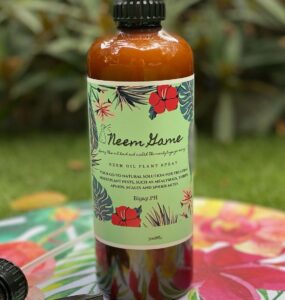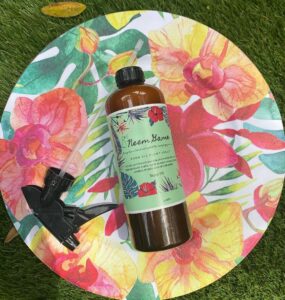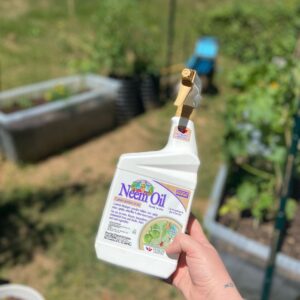Neem oil is a popular natural pesticide that is gaining popularity among gardeners and farmers. It has been used for centuries in India and other parts of the world to control pests in plants and crops.
It is made from the seeds of the neem tree and has been proven to be effective in controlling a wide range of pests, including those that affect tomato plants.
But with the increasing popularity of using natural products for gardening, many gardeners are wondering whether neem oil is safe for tomato plants in human form.
We will examine the benefits and drawbacks of using neem oil on tomatoes and help you decide if it is a suitable solution for your gardening needs. So, let’s dive in and learn more about the benefits and safety of using neem oil on tomato plants.
We will explore the safety concerns surrounding neem oil, its impact on tomato plants, and the benefits and drawbacks of using this natural pest control method.
Breif intro on Neem oil
Neem oil is a popular organic pesticide and fungicide widely used to protect plants from pests and diseases. It is derived from the seeds of the neem tree (Azadirachta indica) and is known for its natural insecticidal and fungicidal properties.

It is effective in controlling a variety of pests, including aphids, whiteflies, and spider mites. In the context of tomato plants, neem oil can be very effective in controlling various types of pests and diseases that can affect the growth and productivity of the plants.
Is neem oil good for tomato plants?
Neem oil is safe for tomato plants if used correctly. It works by disrupting the reproductive system of pests and preventing them from feeding and laying eggs, thus reducing their population and limiting the damage they can cause to the plants.
One of the primary benefits of using neem oil on tomato plants is that it is an environmentally friendly alternative to synthetic chemicals that can harm not only pests but also beneficial insects and the soil.
It can also prevent the spread of fungal diseases, such as powdery mildew and late blight, affecting the foliage and fruit of tomato plants.
However, it is important to dilute the oil according to the manufacturer’s instructions and to avoid applying it in hot, sunny weather, as this can damage the plants. Additionally, it’s recommended to test the oil on a small, inconspicuous part of the plant before treating the entire plant to ensure it doesn’t cause any harm.
Are there any benefits of neem oil for tomato plants?
As a botanical product, neem oil has a long history of being used in traditional agricultural practices. For tomato plants, neem oil has several potential benefits that can contribute to the overall health and productivity of the plants.
- Protection against pests: Neem oil acts as a natural insecticide that helps to keep pests like aphids, whiteflies, and spider mites from damaging tomato plants. It works by interfering with the insects’ growth, mating, and feeding habits, making it less likely for them to reproduce and spread.
- Promoting plant health: Neem oil is a natural plant growth promoter that contains vitamins and minerals that can enhance the plant’s growth and overall health. It also has antifungal properties that can help protect tomato plants from fungal diseases like late blight, which can cause significant damage to the leaves, stems, and fruit.
- Improving soil fertility: Neem oil is known to improve the soil’s fertility and structure. The oil contains compounds that are beneficial to soil health and can help to increase the levels of essential nutrients, such as nitrogen, phosphorus, and potassium. This can lead to stronger, healthier, more productive plants that can resist diseases and pests.
- Increasing yield: By promoting plant health, reducing pest damage, and improving soil fertility, neem oil can contribute to higher yields of tomatoes. A healthy plant can better focus its energy on fruit production, resulting in larger and more numerous tomatoes.
Neem oil can have several benefits for tomato plants, including protection against pests, promoting plant health, improving soil fertility, and increasing yield. As with any agricultural product, it’s important to follow the manufacturer’s instructions and guidelines when using neem oil to ensure that it is used safely and effectively.

Is neem oil good for fungus on tomato plants?
Neem oil is known to be an effective solution for many fungal diseases that affect tomato plants. It prevents the growth and reproduction of fungal spores and slows down the disease’s spread.
The oil has antimicrobial and antifungal properties that help control various fungal diseases such as early blight, late blight, and powdery mildew. It works by creating a barrier around the plant, making it difficult for the fungus to penetrate the foliage.
How to mix neem oil for tomatoes?
Now you are certain neem oil effectively controls pests and diseases in your tomato garden. To mix neem oil for tomatoes, you will need to follow these steps:

- Choose the right neem oil: Look for pure, cold-pressed neem oil specifically labeled for use in gardens and food crops. Alternatively, you can use a ready-to-use neem oil, which is usable without having to mix it with water.
- Determine the correct ratio: The recommended ratio for mixing neem oil and water is one teaspoon of neem oil to 1 quart of water.
- Fill a spray bottle: Fill a spray bottle with the mixed neem oil solution. Make sure to shake the bottle well before each use.
- Apply the solution: Spray the neem oil solution onto the leaves, stems, and fruit of your tomato plants. Make sure to cover the entire plant, including the undersides of leaves where pests often hide.
- Repeat application: Repeat the application of the neem oil solution every 7 to 10 days or as needed.
It’s important to note that neem oil should only be applied in the morning or late afternoon to avoid sun damage to your plants. Additionally, always follow the instructions on the neem oil product label and be mindful of the recommended application frequency.
Mixing neem oil with water can effectively control pests and diseases in your tomato garden while promoting healthy growth.
How often can you spray neem oil on tomato plants?
When it comes to spraying neem oil on tomato plants, it’s recommended to spray once a week or every 7 to 10 days. However, this can vary depending on the infestation or pest problem you are trying to control.
Also, it is recommended to follow the instructions on the neem oil label, as the frequency of application may vary depending on the brand and the product’s specific use.
It is also important to monitor the plants for signs of damage or stress and adjust the frequency of application accordingly. Additionally, avoid applying neem oil in direct sunlight or when the temperature is above 90°F, as this can increase the risk of damage to the plants.
Neems oil for tomato FAQs
Does neem oil get rid of powdery mildew?
If you’re wondering whether neem oil can get rid of powdery mildew, the answer is yes, it can. Neem oil is a natural pesticide and fungicide that has been shown to be effective in controlling various types of powdery mildew.
However, it’s important to keep in mind that the success of using neem oil will depend on a few factors, such as the severity of the infestation, the stage of the disease, and how soon you start treatment. To get the best results, you should use neem oil regularly as a preventive measure and as soon as you notice any signs of powdery mildew.
Also, follow the instructions on the label carefully and apply neem oil on a dry day when temperatures are between 60°F and 90°F. This will help to ensure that the oil is absorbed properly and that the disease doesn’t spread further.
Neem oil for tomato worms, does it work?
Neem oil is also effective for tomato worms. To use neem oil on tomato worms, mix a small amount of oil with water and spray it on the affected plants. You’ll want to do this in the early morning or late evening when the sun is not too intense to avoid any potential damage to your plants. Repeat this process once a week until the worms are gone.
One of the best things about using neem oil is that it won’t harm beneficial insects like bees, butterflies, and ladybugs. So, not only are you keeping the tomato worms at bay, but you’re also supporting the overall health of your garden’s ecosystem. So, if you’re looking for a simple and safe way to get rid of tomato worms, give neem oil a try.

Is neem oil safe for edible plants?
If you’re growing edible plants and considering using neem oil as a pest control method, it’s important to know whether it’s safe for your plants.
Neem oil is known for its effectiveness against many pests, including aphids, whiteflies, and spider mites.
While neem oil is generally considered safe for edible plants, there are some concerns about its safety for human consumption. Some studies have shown that neem oil can have toxic effects when consumed in large amounts, so it’s best to use it cautiously.
Some individuals may experience an allergic reaction to neem oil. It’s always recommended to follow the instructions on the label when using neem oil and only use it in the recommended doses.
When using neem oil on edible plants, it’s important to wait until the oil has dried completely before harvesting your crops or properly before consuming.
what plants not to use neem oil on
If you’re using neem oil as a natural pest control solution, there are a few plants you should be careful with. Some plants are sensitive to the oil and can be harmed if exposed to it, so it’s important to be mindful of what you’re treating.
Here are some plants that are not recommended to use neem oil on:
- Ferns: Ferns are quite delicate and can be easily damaged by neem oil, so it’s best to avoid using it on these plants.
- Cacti and succulents: These plants have thin and sensitive skin, and neem oil can easily harm them.
- Orchids: These exotic flowers are delicate and can easily be affected by neem oil, causing them to wilt or discolor.
- Chrysanthemums: These popular flowers can be sensitive to neem oil and easily become damaged if exposed.
So if you have these plants in your garden, it’s best to avoid using neem oil on them. Instead, try alternative natural methods to keep pests and diseases at bay, such as using insecticide soap, hand-picking insects, removing infected leaves, or using other natural solutions.
Conclusion
As stated above, neem oil can be safe for tomato plants if used correctly. It is a natural pesticide that helps control pests and diseases in tomato plants. However, it is important to follow the instructions on the label and avoid using too much neem oil, as it can be harmful to the plant if overused.
Additionally, it is important to remember that neem oil may not be safe for beneficial insects such as bees and butterflies, so it should be used cautiously in areas where these insects are present.
Also, it is recommended to test a small area of the plant before using it on the entire plant to see if there is any adverse reaction. Overall, neem oil can be a great option for organic gardeners looking to protect their tomato plants while avoiding harsh chemicals.
